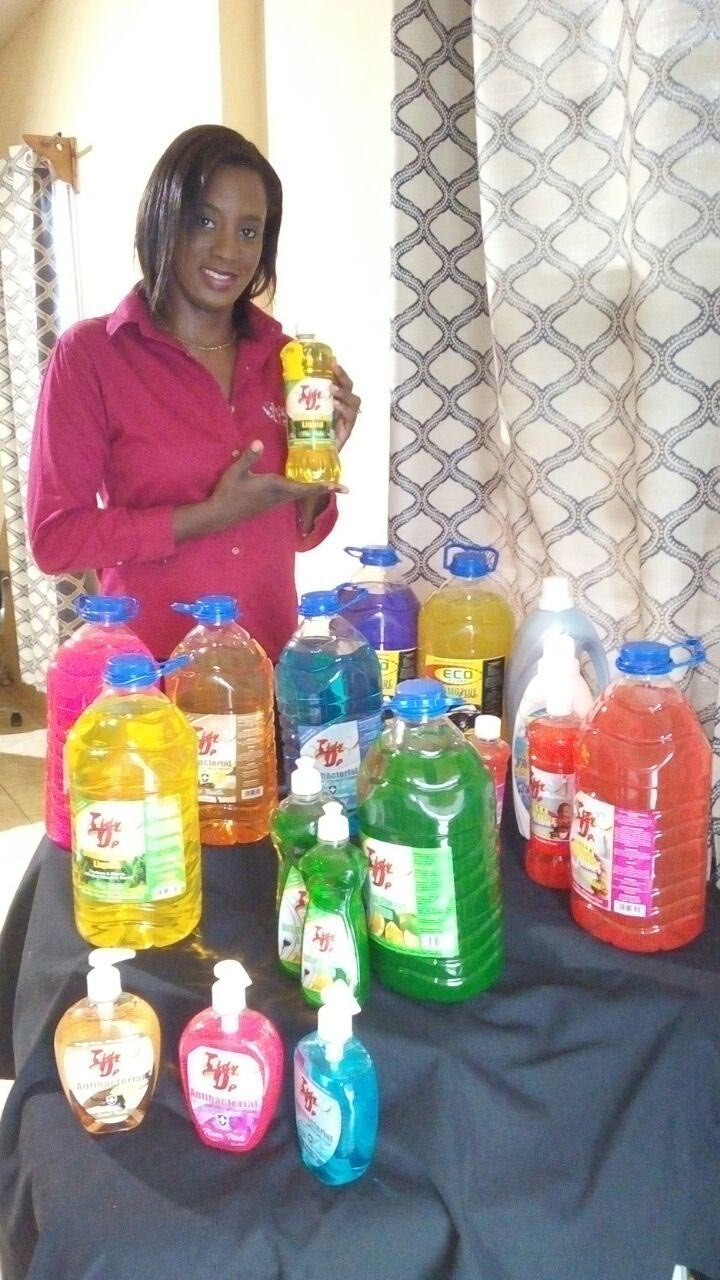A year into owning and operating what is almost certainly the first local company to manufacture such a broad range of detergents and sanitizers, Melissa Younge readily admits that her efforts to secure significant market recognition against a product base long dominated by better-known foreign brands has been no proverbial ‘walk in the park.’ Far from losing heart, however, she appears determined to soldier on, seemingly animated by a feeling that as far as business trends are concerned, the proverbial work is beginning to turn in Guyana.
For now, she is encouraged by the reviews of a modest customer base that includes Andrews Supermarket, a relatively small community supermarket on Aubrey Barker Road in South Ruimveldt.
Tidy Up, the brand name given to Dunae Trading’s products, comprises eight cleansing-related products………… Dishwashing Liquid, Antibacterial Handsoap, Multipurpose Cleaner, Disinfectant Liquid, Laundry Detergent Liquid, Fabric Softener, Ecoguard Carwash Liquid and Ecoguard Degreaser Liquid. Each of these, she says, has benefitted from the fact that she is well-schooled in the science associated with their research and production.
She has entered the realm of manufacturing cleaning agents with an eye-catching resume that ranges from a Bsc. Degree in Chemistry from the University of Guyana to holding down various sensitive positions in Quality Control and Laboratory Management in local companies including the National Milling Company (NAMILCO) and the paint manufacturers, Torginol. In Trinidad and Tobago, where she has also lived and worked, she remained in the same field. It was after she moved to Dominica, however, that she began work in earnest developing her own line of janitorial products and while there still remains a considerable gap between investment and returns, a circumstance that can easily cause lesser entrepreneurial spirits to sink, Melissa remains optimistic.
She had been challenged to bring her skills and her entrepreneurial outlook back to Guyana by the promise it has always offered as a country that had, over the years, advocated local market opportunity for home-grown products; and if – or at least so it seems – her faith in that philosophy remains undiminished she is unhesitating in her view that the now decades-old ‘buy local’ slogan cannot stand in isolation from concrete policies that provide the concept with sturdy legs upon which to stand.
If she is firm in her view that supermarket shelves and other outlets must help to reflect the country’s manufacturing base, hers, she says, is no arbitrary protectionist policy. By the same token she believes that space simply must be created for locally manufactured products that have evolved out of hard work and costly investment by mostly single investors and family groups. The ‘buy local’ policy, she says, must begin with an aggressive and wide-ranging support for the efforts of local manufacturers and extend to a preparedness on the parts of both distributors and consumers to be ready to at least test the quality and the cost of the imported products, backed by strong branding and big advertising budgets against the locally produced options.
In her quest to grow the local market for the Tidy Up range, Melissa says that she has encountered some barriers that have been frustrating…like tedious (even if understandable) tender procedures that frustrate her efforts to get her cleaning agents established is the washrooms and other spaces in state-run premises and what she considers to be the altogether unacceptable habit of tender notices that actually name the brands of cleaning and sanitizing agents which clients are in the market for, a circumstance which, she says, amounts to a negative comment on the locally produced options. “Those stipulations, she says, have the effect of locking out many local products.”
She welcomes the commitment given recently by Small Business Bureau Chief Executive Officer, Dr. Lowell Porter that the Bureau will give its support to the continued growth of emerging businesses by allocating resources to training and further investment though she believes that a real breakthrough for emerging manufacturing entities like Dunae Trading may well rest with the actualization of the provision in the Small Business Act that allows for 20% of state contracts to be allocated to the small business sector.
If, she says, she does not want to paint a picture of a small business sector that is thoroughly dependent on being propped up by the state she believes that when the larger role of small and medium-scale enterprises is considered in the context of its potential contribution to economic growth and to boosting employment levels, government has every incentive to show the way, to seek out opportunities to help to raise the sector off the floor. Melissa, however, refuses to wait around. She says she intends to knock on doors and seek the kind of support which she believes can turn around the fortunes of the modest manufacturers as a whole, confident that given the work that it has done over the past year Dunae Trading and its Tidy Up Products can get caught up in the forward-moving groundswell.






